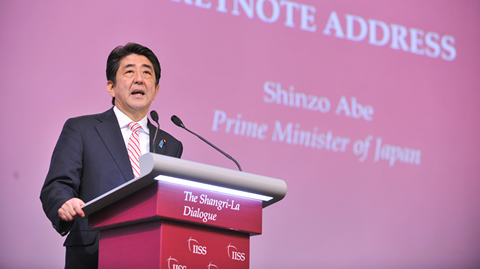Amid rising tensions in the East and South China Seas, the International Institute for Strategic Studies hosted the 13th Shangri-La Dialogue (also known as the Asia Security Summit) in Singapore from May 30th to June 1st. The forum, which brings together high-level officials and heads of state from around East Asia, is meant as a platform to discuss regional security issues and foster bilateral and multilateral security ties. While this year’s conference featured the American and Chinese delegations trading barbs throughout the weekend, it was Japanese Prime Minister Shinzo Abe’s keynote address, however, that raised the most eyebrows.

The Prime Minister’s speech had three main messages: a call for international law to be used in settling disputes, strengthening Japan’s ties with ASEAN (Association of South East Asian States) member states, and a changing Japanese national identity. While China was only directly mentioned three times (and twice more in passing), the speech was clearly a response to China’s recent actions in the South and East China Seas, which many states in the region see as provocative and potentially destabilizing.
In essence, Mr. Abe laid out how Japan would begin to take a more active role in the region, both diplomatically and militarily. He called for the three principles of international law of the sea to be respected and used to mediate disputes in the region, a tacit criticism of China’s actions in its disputes with Vietnam and the Philippines. Interestingly, when asked if international law should be used to mediate the Senkaku/Diaoyu island issue between Japan and China, Mr. Abe stated that the use of international arbitration in this instance was unnecessary as the islands were a part of the ‘inherent territory’ of Japan.
Mr. Abe also committed to strengthening ties with ASEAN member states to promote Japan’s active role in the region. He stated that Japan fully supported Vietnam and the Philippines’attempts to resolve their disputes with China peacefully. He discussed his government’s decision to provide patrol vessels to both the Philippines and Indonesia (with plans to provide Vietnam with vessels as well), all of whom have ongoing territorial disputes with China. Furthermore, he described how his decision to reverse Japan’s 1967 weapons export ban will allow the country to be able to strengthen its ASEAN allies and protect free air and sea navigation.
In response to China’s increasing assertiveness in the region, Mr. Abe has committed Japan to a much more active role in the region.
Lastly, the Prime Minister discussed the changing identity of Japan, what he called the ‘new Japanese’. These ‘new Japanese’, according to Mr. Abe, have a love of democracy and human rights and a desire to bring the peace and prosperity that these values have given to Japan to the region. In keeping with this desire, Mr. Abe’s discussed his recent changes to Japan’s longstanding ban on deploying military forces overseas and his desire for Japan to play a role in promoting peace globally. He cited the Japanese Self Defence Forces’role in the United Nations peacekeeping mission in South Sudan as an example of how Japan will move forward in this regard. This would require a complete reinterpretation of Article 9 of Japan’s constitution, a move that would raise tensions with China even further.
All in all, Mr. Abe’s speech arguably set out a new path for Japanese foreign policy, a path very much influenced by the rise of China. In response to China’s increasing assertiveness in the region, Mr. Abe has committed Japan to a much more active role in the region. His emphasis on ties with ASEAN member states and a more active military role for Japan can be seen as another instance of balancing against China’s growing influence in the region. While it is too early to say whether this will become a fully-fledged foreign policy doctrine, it has all the right characteristics. It has the ideological tone (the emphasis on the ‘new Japanese’and their values) and the policy guidelines (the emphasis on international law and a more assertive Japan) that could allow Mr. Abe to put his stamp on the region.




